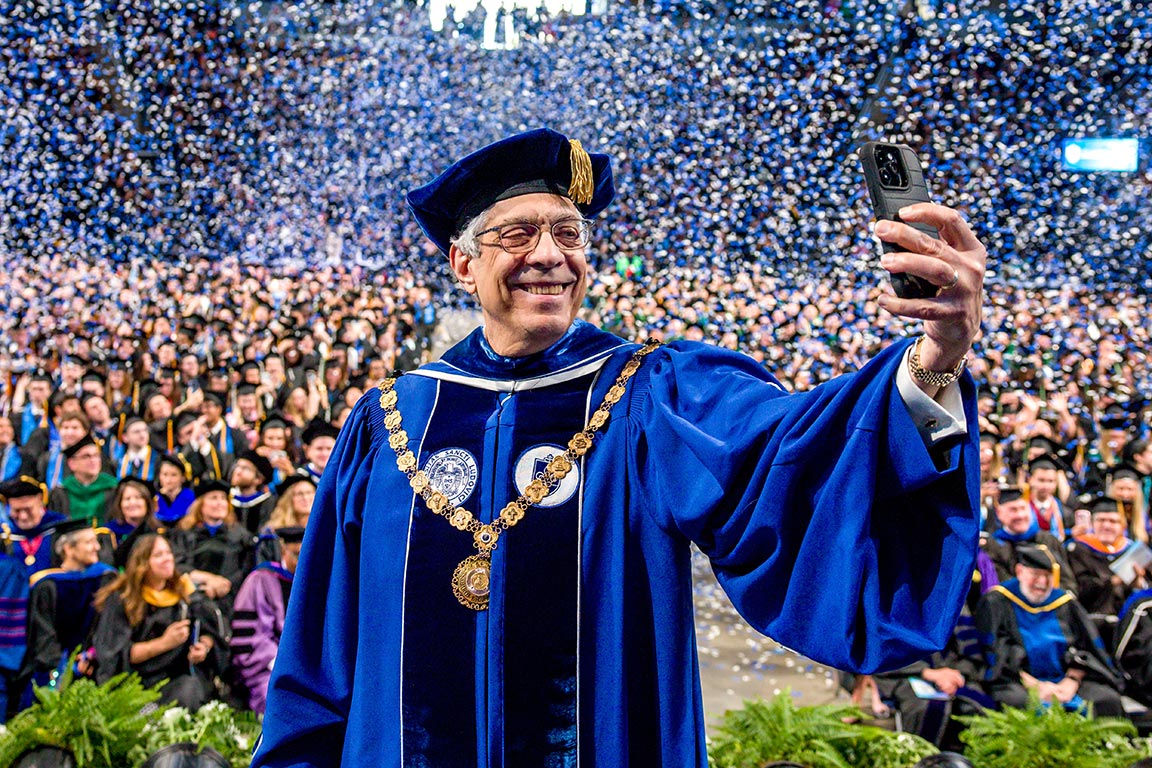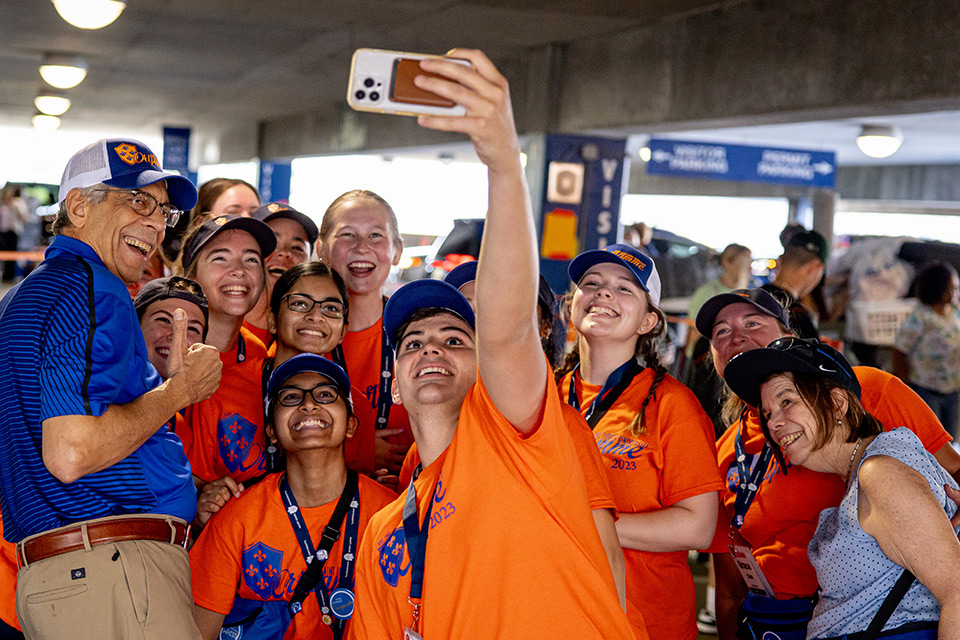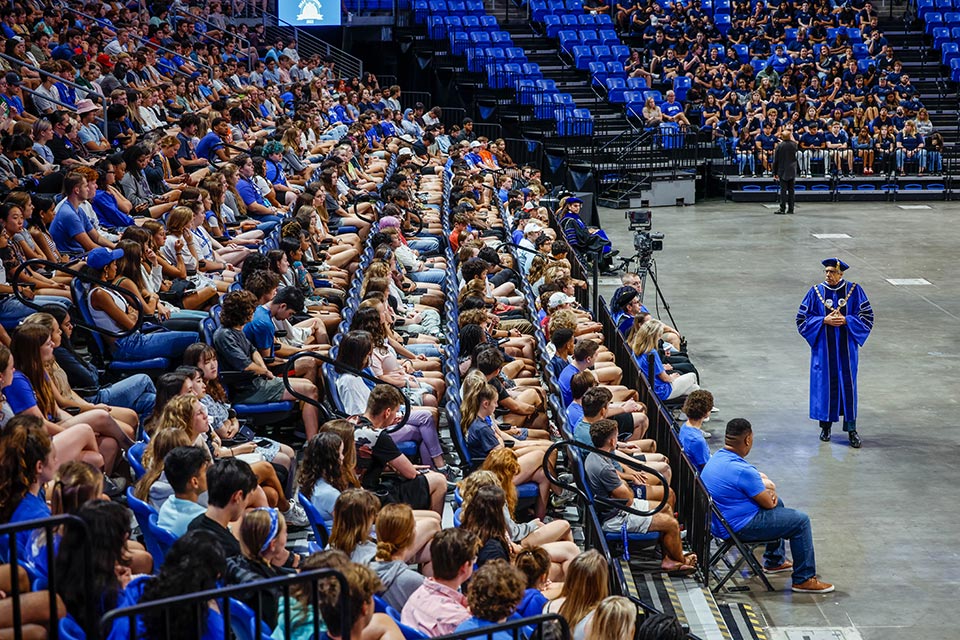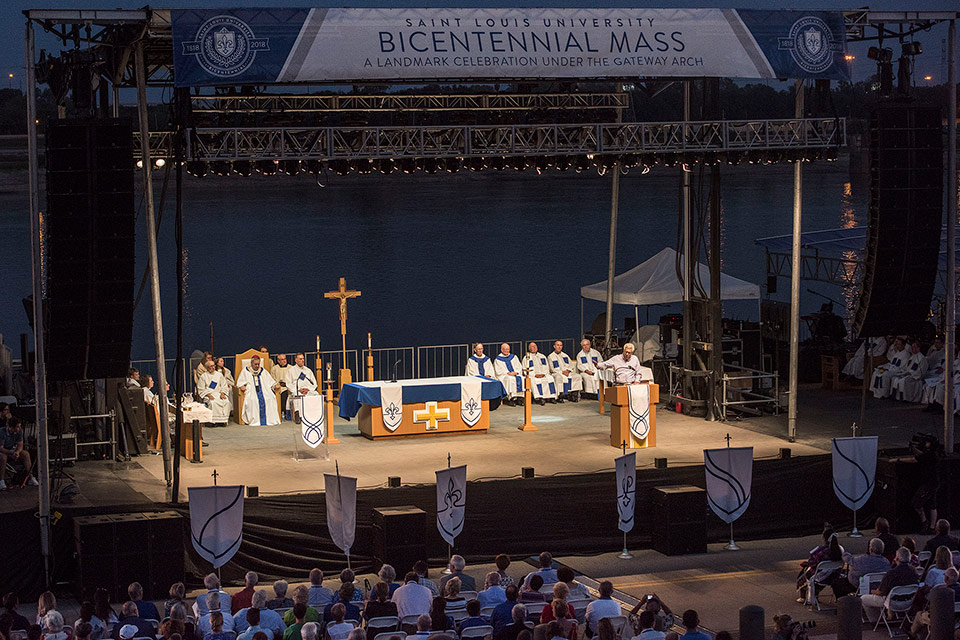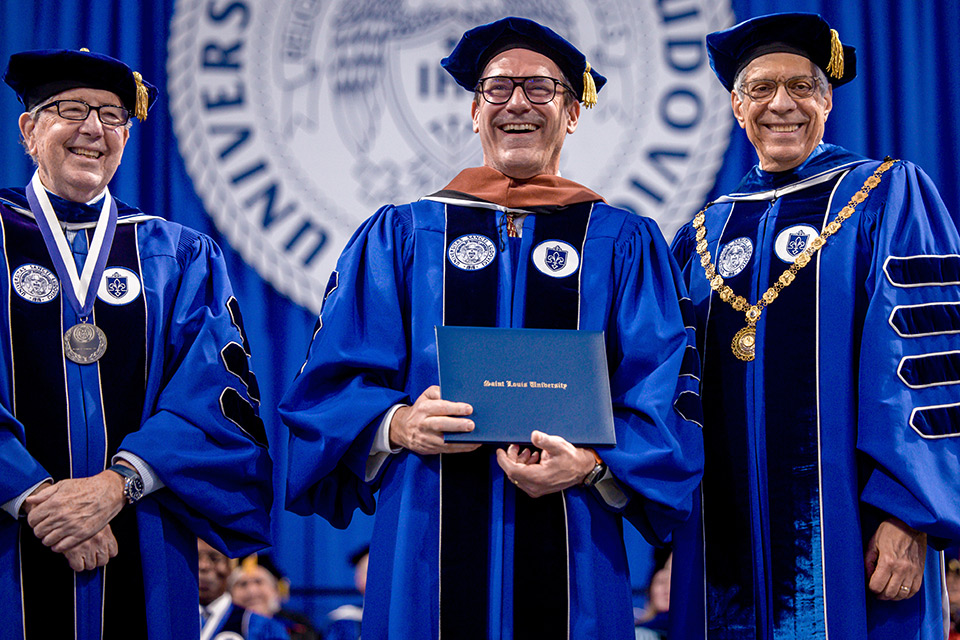Selfie-Reflection
There is no off switch for a university president. It’s a 24/7 job. There are meetings all day, every day. There are countless after-hours commitments — including sporting events, ceremonies and student activities. Quiet meals at home are rare. And sleepless nights are part of the job.
But Saint Louis University President Dr. Fred P. Pestello’s schedule is about to change.
On June 30, he will step down as SLU’s 33rd president and, after a sabbatical, return to the teaching and scholarship that marked his early career.
It is a big shift, but one he knows is coming at the right time. Pestello, SLU’s third longest-serving president, will have been in the role for 11 years — nearly doubling the average 5.9-year tenure of a university president.
Those years were filled with highs and lows. Challenges and lessons. A bicentennial celebration and a sobering pandemic.
Pestello, who will turn 73 years old at the end of his term, is ready to move on to his next chapter. But before going, he sat down for one final interview to reflect on the work and institution he holds so dear.
UTAS: You were SLU’s first lay president. What did that mean for you and for SLU?
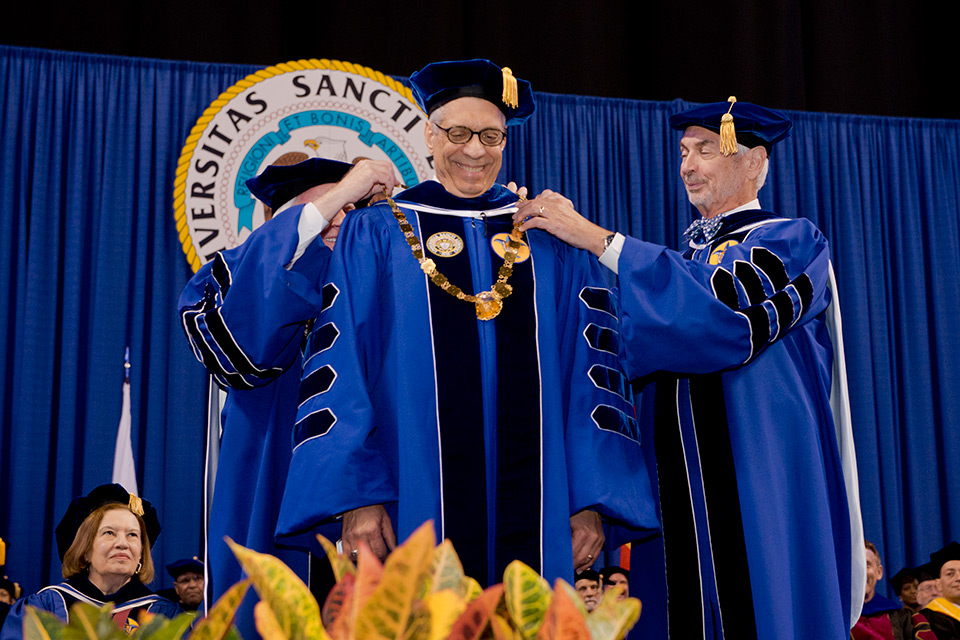
PESTELLO: Shortly after I became the second lay provost at the University of Dayton, we hired our first lay president. Several years later, I was appointed the first lay president of Le Moyne College. In 2014, I became the first lay president here. So, I’ve seen that transition up close as provost, and I had already lived it prior to joining SLU.
I, and others I know who have become first lay presidents, take mission promotion very seriously. We realize what is expected of the leader of these sacred organizations.
Where I have been especially blessed in this effort is the overwhelming support I have enjoyed from the members of the sponsoring order of the universities at which I have worked — the Marianists at Dayton and the Jesuits at Le Moyne and SLU. These men stood by me through good times and not-so-good. Their generous investment in my development and success has been critical to my ability to lead at three faith-based organizations. The same holds true for the astute archbishops with whom I have collaborated in Dayton, Syracuse and St. Louis.
UTAS: How did you put SLU’s Catholic, Jesuit identity front and center?
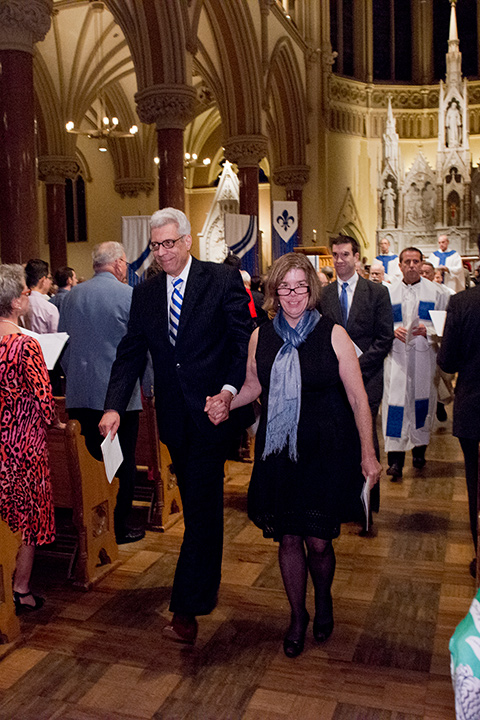
PESTELLO: Right from the start, it is how I thought about and talked about our university. I did so in the search process. I did so when I was announced as president. As those who have heard me speak then or since, I always say that we are a Catholic, Jesuit, international, urban, residential, research university. I intentionally start with Catholic, Jesuit because that is what makes us most distinctive and is most essential to both our identity and decision-making. That is the touchstone, the foundation, the core from which everything flows.
UTAS: Your most recent vision statement is “To be a global Jesuit university — one that is mission-focused, student- and patient-centered and research-driven, working with the people of St. Louis to reimagine, transform and unify our city.” Why is that your vision?
PESTELLO: That vision came from the times in which we are living. It came from becoming acquainted with the region, getting to know the University and having many conversations with the people of SLU and St. Louis about their aspirations and commitments.
I worked with my astoundingly talented and dedicated office team in crafting a few iterations until we arrived at that statement. We shared it selectively among constituent leaders, then broadly. And we heard back that we nailed it. It rings true.
We are mission-driven — the vision starts with that. Our mission requires us to be student- and patient-centered. We are research-driven, and research has been a key priority from my start. And as the oldest continuing organization in the St. Louis region, with St. Louis University High School, we have been a part of the fabric of everything that has happened here for the last 207 years. In many ways, people look at us as “St. Louis” University. People in this community think highly of us and have high expectations for us. They count on us to be a catalyst that helps reimagine, transform and unify our city.
UTAS: Do you feel like we’re on the path to achieving that vision?
PESTELLO: Yes, I very much do, particularly during the last few years. The strides we have
made in becoming global and international are extraordinary. We have so many more
international students here — literally thousands more than we did a few years ago.
The Madrid campus has grown substantially, and I suspect that will continue to accelerate
because of the quality and commitment of the faculty and staff there in the culturally
rich capital of Spain. We are currently in conversation with several international
universities about partnerships
and joint programs.
We are absolutely mission-focused. One of the things that is very clear in surveys of our faculty and staff is that they understand, are committed to and highly value our mission. We always turn to our mission and Gospel values when faced with critical decisions.
If you talk to our students and our patients, you will find that they feel that they are put at the center. Our students speak authentically and compellingly about what the faculty and staff mean to them, do for them and how engaged they are in their development. The same is true for our patients. Our physicians and health care professionals treat them as unique, whole persons and are very much concerned with them in the spirit of cura personalis.
And we are research-driven. We have excellent scholars across the University, and I am delighted that thanks to their hard work, SLU achieved R1 status.
UTAS: That leads to my next question. In your first Universitas interview in 2014, you said, “One achievement that would please me is if SLU were to widely and universally be thought of, both nationally and internationally, as unquestionably one of the nation's very top Catholic research universities.” And now, as we know, SLU is an R1 institution. Why was research a priority 11 years ago? And for alumni who aren’t familiar with R1, why is that distinction so important?
PESTELLO: When I came, I saw the caliber and ambition of the faculty, and I thought, “This is a research university that just needs the right investments and the right structures of support to become R1.” We have worked to provide that infrastructure, and the faculty has delivered. We were able to achieve R1 sooner than we initially imagined. And I must mention it is also thanks in no small part to the generosity of our donors, particularly Dr. Jeanne and Rex Sinquefield (CSB ’67).
I also found our loyal alumni and devoted trustees are invested in SLU. They are very
ambitious for us. If you look at the most prestigious
doctoral institutions across the country, they are all R1. This level of research
volume allows you to attract stronger faculty. It allows you to attract more funding.
It allows you to engage more students in cutting-edge research. The bigger the infrastructure,
the more research you can support, and it will continue to grow. I look forward to
watching SLU accelerate its excellence in research and scholarship.
UTAS: Years from now, when people look back on the Pestello presidency, what do you hope they’ll remember?
PESTELLO: That together, all of us, strengthened and elevated SLU’s reputation locally and nationally. When you consider how we managed our most difficult challenges and took advantage of our greatest opportunities, you will see that our successes were a result of coming together as OneSLU — a term we coined during the COVID-19 pandemic — guided by our values, supporting each other and keeping our focus on where we aspired to be.
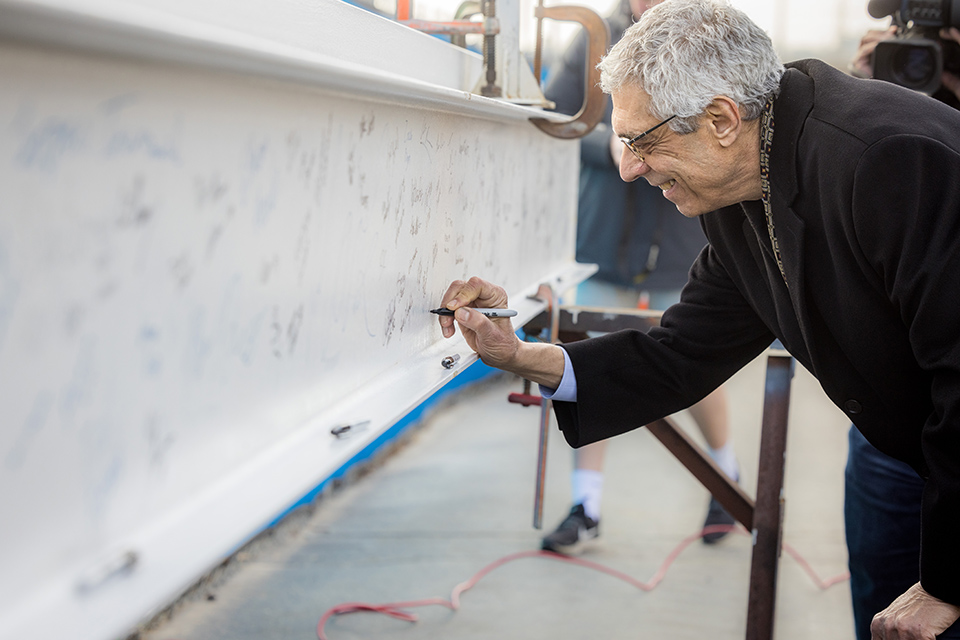
UTAS: You’ve certainly had an impact on the physical campus, including two new residence halls and the Sinquefield Science and Engineering Center, but you’ve also had an impact on SLU’s neighborhood.
PESTELLO: When I first arrived, I was particularly concerned that many areas around campus, particularly the area between the north and south campuses, were blighted. That’s where we focused. Perhaps most significantly, we established the Midtown Redevelopment Corporation with SSM Health. And the Midtown area has been entirely transformed at a pace many thought impossible.
Look at the multifaceted City Foundry STL project with local food vendors, brick-and-mortar shops run by local business owners and a Fresh Thyme market that features goods from local companies. We have given local entrepreneurs another destination in which to thrive and grow.
Look at the area between Grand and Compton on Chouteau with the Topgolf, Steelcote Lofts and Target — it’s been transformed. And we know there is more to come. We expect Target will attract other retail and commercial businesses.
And to the west on Chouteau, we have the gleaming new SSM Health Saint Louis University Hospital, and a new SSM Health Cardinal Glennon Children’s Hospital rising out of the ground.
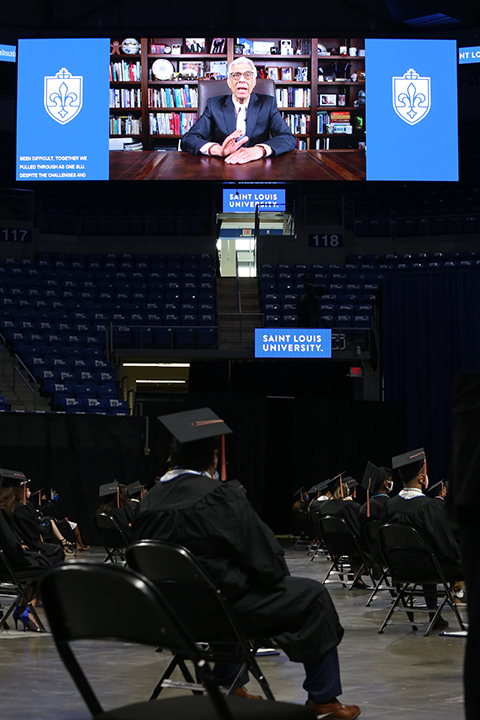
UTAS: If you could go back to when you were appointed president in 2014 and give yourself some advice, what would you tell yourself?
PESTELLO: There was a lot of disruption and change in my first few years; it was intense and stressful.
At first, you are an unknown, and others, both inside and outside of the organization, are unknown to you. You lack networks and deep relationships upon which you can rely for objective assessments and guidance. And in the midst of it all, you don’t know how it’s going to turn out. You live with that great uncertainty. In the end, I believe that it worked out well. We successfully managed through some incredible challenges and obstacles — when many had predicted failure.
So, I would go back to 2014 and 2015 and tell myself, “You will be all right. It’s going to be all right.”
UTAS: Are there any accomplishments that you look back on with pride?
PESTELLO: Certainly. I’m proud of many things we have achieved. Partnering with SSM Health and transferring control of SLUCare were historic changes that were beneficial for all. This year, we have the largest enrollment in SLU’s history. I am thrilled with the development we have stimulated in the Midtown area. I am thankful for the great success of the Accelerating Excellence fundraising campaign and that our generous donors continue to support us at record levels. I take pride in the ground-breaking scholarship we produce, the excellent education we provide and the extensive community-based services we deliver in this region, in Madrid and beyond.
I am proud of the leadership team we have created and the trust and transparency we built across the organization. We have increased information-sharing and improved communication. Our operational plans are stronger and smarter. We execute those plans more seamlessly.
We collaborate more effectively. There is more inclusive decision-making. And while there is so much yet to do and ways to improve, I am proud of how far we have come on this journey — together.
UTAS: What is your favorite memory as president?
PESTELLO: There are so many. But I really do love the ceremonies. My favorite is our new student convocation each August. It is the ceremony I love the most — welcoming our new students as Billikens and their families. Describing this institution and the opportunities it offers for them is a joyous moment for me. It’s also a moment where I can reassure parents that they have made the right choice. And here at SLU, their children have an environment in which they can achieve, grow and thrive. I also have great memories of our stellar bicentennial celebrations — the Mass at the Gateway Arch, the symphony concert, the gala kicking off our fundraising campaign — all are powerful memories. Being able to be president at that historic moment in the University’s long history was moving.
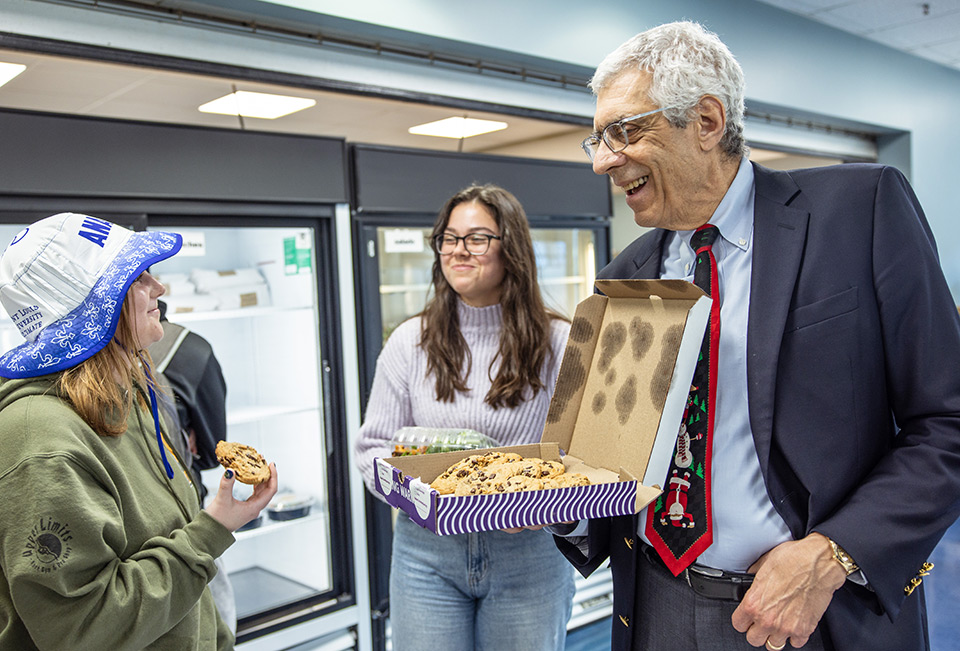
UTAS: What were the best decisions you made as president?
PESTELLO: That is for history to judge.
UTAS: As president, you’ve weathered some storms, particularly the clock tower occupation in 2014 and the COVID-19 pandemic. How did those affect you and SLU?
PESTELLO: Each time one moves through a crisis, one learns and grows from it — and the organization becomes stronger and more resilient.
I was president for barely a month when Michael Brown was killed, and this city — my new home — erupted. Two months later, after more than 1,500 students and non-students rallied on our campus, the occupation near our clock tower began.
Throughout those six October days, I learned a great deal about this University and its people. It reinforced my long-standing belief that no one accomplishes anything of significance alone. The higher you are in the organizational chart, the more reliant you are on others.
To succeed as a leader, you need a team of talented people you trust, who also trust you, and with whom you lock arms and undertake the work of the organization. This begins with the President’s Office staff and radiates out from there. Those with whom I work are selfless, talented and all-in on SLU.
COVID-19 was a nightmare for everyone — starting with the stay-at-home order and the swift loss of life, and the heightened awareness of those most vulnerable to the virus. The impact on our families, both socially and psychologically, was just devastating.
We learned that we could pivot very quickly to remote instruction and work. We deftly managed a move-out from our residence halls while creating safe housing for those students who remained on campus — as well as providing safe housing for our frontline health care workers who could not risk unwittingly transmitting the virus to vulnerable loved ones.
We were not quite as effective overall in educating and forming students remotely, but we did our best. I would have never imagined that we could quickly flip to a virtual organization. But we did.
COVID showed how we could come together to protect our families, the University community and city residents from a virus about which we had more questions than answers. We heard very early on that our students wanted to be back on campus. They missed their roommates, classmates and friends. They longed for the generous out-of-class support from our faculty and staff they’d come to expect. And we heard from our faculty and staff that they preferred to work in person with our students.
We were able to come back to campus in August 2020 when many other institutions didn’t, and we never shut down. Impressively, we maintained lower rates of positivity than the surrounding area throughout, thanks to the hard work of many people and our students’ compliance with the rules we set to protect members of our community.
The day we opened our first vaccination clinic in Simon Rec, there were tears of joy. We thought, “We can beat this.”
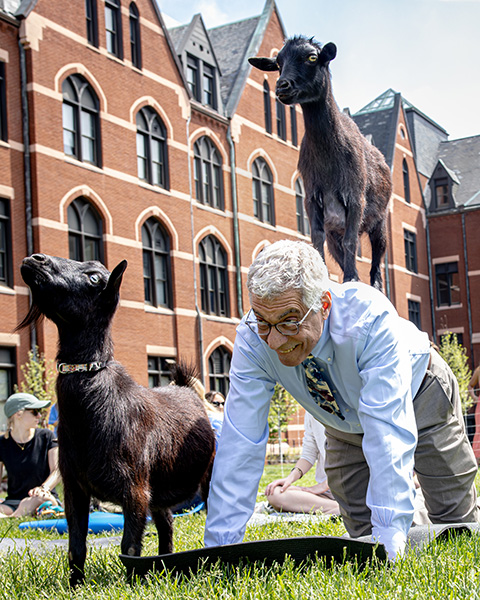
UTAS: St. Louis has become your home over the last 11 years, and you plan to stay here. Why?
PESTELLO: My spouse, Fran, my children, Vitina and Freddie, and I very quickly fell in love with St. Louis. Fran and I appreciate a number of things about the city. We love the different neighborhoods and their defining characteristics. It’s architecturally interesting.
We love Forest Park and the culinary scene. The quality and variety of the arts here is extraordinary — including in Grand Center, an easy walk from North Campus. St. Louis has nearly everything that one would desire or expect in a top metropolitan area. Yet it lacks the congestion and sky-high cost of living of the nation’s very largest cities.
UTAS: Your spouse, Dr. Fran Pestello, was SLU’s first first lady. How has she been a support to you and an asset to SLU?
PESTELLO: The best decision I ever made was proposing to my spouse. I absolutely could not have my career without her. She made a major sacrifice when we came to SLU because she decided that she would give up life as a full-time tenured faculty member and devote considerable time to supporting my role, the University and the community.
Although she has taught as a SLU adjunct professor — and loves it — and has participated in many initiatives here, including the St. Louis Literary Award, Fran has devoted a tremendous amount of time to directly supporting me and extending my presence and influence. She welcomes. She bonds. She mentors. Students, staff, faculty, trustees and donors all respond so warmly to Fran. It’s wonderful to witness.
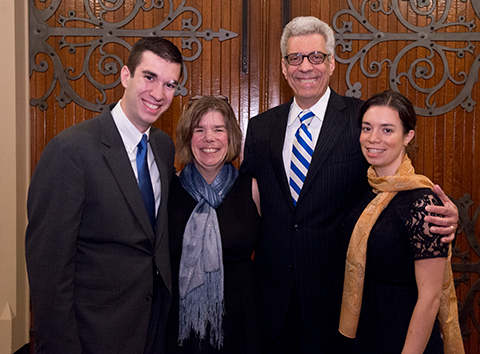
Fran’s commitment to complement and work in tandem with me has made it easier for me to be as effective as I have been, to whatever extent that is. I simply could not have done it without her making those sacrifices.
And I should add that our wonderful children and their partners have made sacrifices for my career, as well as being an enormous comfort and support.
UTAS: What’s next for you?
PESTELLO: I will take a sabbatical and then join the faculty. Teaching has always been a joy. I love our students. My office knows that if I get cranky, they will encourage me to go out to be with some students because it inevitably puts me in a good mood. A few selfies, and I am good as new.
Throughout my many years as an administrator I have always thought of myself as an academic at heart.
I believe that has helped me be a better president. I now want to go back to the joy of devoting extended periods of time to diving deep into lines of inquiry. That level of intellectual commitment has not been possible for me in this role. I miss the joy of the intellectual journey, and I’m looking forward to returning to it. And just spending more time with the books that line my shelves here and at home, too many yet to be read. I also look forward to reading more broadly than time currently allows.
UTAS: What advice would you give to SLU’s incoming president, Dr. Edward Feser?
PESTELLO: Dr. Feser realizes that he’s joining a wonderful, mission-focused university. That is what attracted him. He is well-equipped to lead SLU to higher levels of excellence.
I would advise him to continue to follow his heart and be guided by our mission.
UTAS: Do you have a message for alumni?
PESTELLO: I would like to thank them for their embrace of me, Fran and our family. Their support and encouragement have been critical to me, particularly during those times that have been the most challenging.
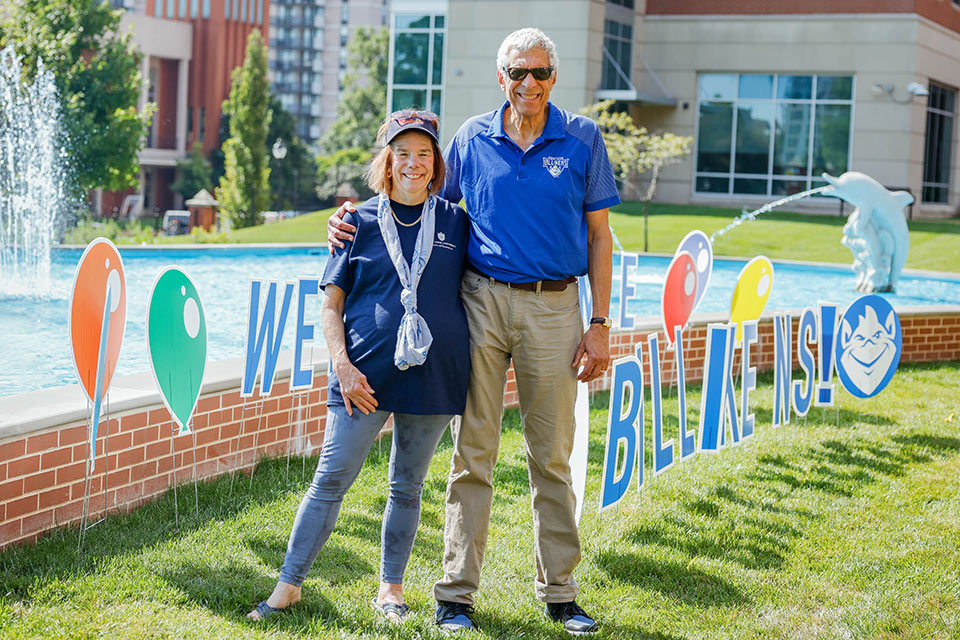
I know that SLU alums have deep affection for this institution. I have seen and felt it. It’s front and center when I meet with alumni.
They have enormous pride in this University. I appreciate them for being the wonderful Billikens they are and for all the good work that they do in the communities in which they live, work and serve. They both motivate us and make us proud.
UTAS: Do you have any final thoughts?
PESTELLO: I feel extremely fortunate to have had such a meaningful and fulfilling career. It has been a privilege to serve as president at SLU — to work in this global Jesuit university with its noble mission and values — which does so much to advance knowledge and understanding, form young men and women of character, compassionately treat patients, improve our communities and work around the clock for a more just world.
I was blessed to work with smart, caring, devoted colleagues and with young, energetic, idealistic students who are eager to learn, so that they can ultimately venture from SLU and, as St. Ignatius encouraged, set the world on fire.
About Universitas
Universitas, the award-winning alumni magazine of Saint Louis University, is distributed to alumni, parents and benefactors of the University. The magazine includes campus news, feature stories, alumni profiles and class notes, and has a circulation of 103,000.


















